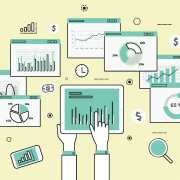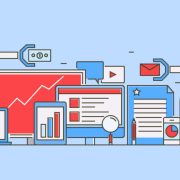ERP Systems and Why It’s Good To Use One In Business
With the benefits ERP software offers to businesses, the impact of these systems is evident. However, organizations who don’t use ERP software may not understand why it might be important for them. However, as competition increases, businesses need to use tools and platforms that can give them an edge.
Why Use ERP Software?
These systems are utilized to manage various business functions. However, are we sure that it’s better compared to other solutions? Although ERP systems have goals identical to those of other software types, it possesses unique features making it a distinctive competitor in the market. Here’s why it’s good to use ERP software in a business.
1. It helps improve collaboration.
ERP systems provide a centralized database, thus giving your company a single source of data to work on. This helps prevent errors and discrepancies due to incorrect data.
A single database minimizes stalling or hesitation of projects since every team member can acquire company-wide data. Merging data from various sources or systems is unnecessary because all information is stored in a single system. Data becomes accurate, secure, and complete because of its centralized nature.
2. It helps save more time and money.
ERP unifies various divided systems, such as accounts payable and product development. Thus, with a single centralized system, your staff will utilize time efficiently. Users don’t have to get information from fragmented systems.
Businesses can save more money as they don’t have to train employees on multiple software. This minimizes the logistical effort and amount of money spent on training. Organizations communicate with only one vendor to conduct training sessions.
3. It provides better analytics.
A single centralized database helps to improve reporting and analytics, enabling it to become an excellent tool for business intelligence. With robust functionality, users can generate detailed reports in a short period of time. This could take multiple days to complete without an ERP.
Customizable dashboards allow executives to view reports when they use the system. Reports are broad-ranged from custom KPIs to income statements. Quick access to reports will enable organizations to make informed decisions that lead to the improvement of the business. In addition, security access levels ensure that relevant staff are the only ones who can view company information.
5. It leads to happier, more satisfied customers.
Managing your customers has never been easier with ERP software. Most systems come with a CRM or can be integrated easily with one. Through the ERP system, the CRM gains data access from multiple business functions.
Various info regarding a customer can be obtained, such as contact details, order history, and billing data. Thus, teams can view a holistic picture of customers helping them understand their needs and wants. Sales strategies can be targeted through data obtained from the ERP system. Customers are now provided with relevant offers that can make their lives easier and better.
6. It helps simplify risk management and compliance with regulations.
Businesses who are present in different countries can face problems and difficulties when it comes to complying with regulations. Even local businesses need to follow various information security, environmental, human resources, and accounting regulations.
A lot of ERP software helps you comply with these regulations at each stage. In addition, these systems provide auditing tools to help with documentation, including tax provisions and chemical use. Reports can easily be created and sent to regulating bodies.
ERP software also provides tools for risk management. The system has enhanced accuracy and reliability, leading to less error during the accounting process. Tools for forecasting allows prediction of events such as budget, labor, and demand. With reliable data, businesses can formulate schedules, secure budgets, and robust product development strategies.
7. It helps improve productivity.
With traditional methods, tasks become tedious. Activities like monitoring inventory, generating reports, processing orders, and timesheet tracking take hours to finish. Aside from taking too much time to accomplish, these types of processes lead to diminished employee morale and lend itself to human error. For instance, after putting in thousands of similar types of data into a sheet, even the best employees are bound to make errors.
Getting the right ERP software allows you to automate tedious tasks. Redundant tasks (e.g., data entry) are eliminated. The software can perform advanced calculations in a short period of time. Thus, employees can have time for more critical, thoughtful tasks leading to increased ROI.
In Conclusion
The benefits of ERP software outweigh the time, effort, and cost necessary for its implementation. Choosing the right solution gives you the proper features and functions to improve your business’ processes, enhance productivity, and increase ROI. Talking to an industry professional can help you find the right ERP software suited to your needs and budget.
















